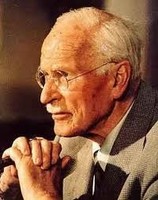Carl Gustav Jung (English pronunciation: /ˈjʊŋ/ YUUNG, German: [ˈkarl ˈɡʊstaf ˈjʊŋ]; 26 July 1875 – 6 June 1961) was a Swiss psychiatrist, the founder of analytical psychology. Jung is considered the first modern psychiatrist to view the human psyche as "by nature religious" and make it the focus of exploration.[1] Jung is one of the best known researchers in the field of dream analysis and symbolization. While he was a fully involved and practicing clinician, much of his life's work was spent exploring tangential areas, including Eastern and Western philosophy, alchemy, astrology, and sociology, as well as literature and the arts.
Jung considered individuation, a psychological process of integrating the opposites including the conscious with the unconscious while still maintaining their relative autonomy, necessary for a person to become whole.[2] Individuation is the central concept of analytical psychology.[3]
Many psychological concepts were first proposed by Jung, including the archetype, the collective unconscious, the complex, and synchronicity. Popular psychometric instruments like the Myers-Briggs Type Indicator (MBTI), have been principally developed from Jung's theories.
His interest in philosophy and the occult led many to view him as a mystic although Jung's ambition was to be seen as a man of science.



